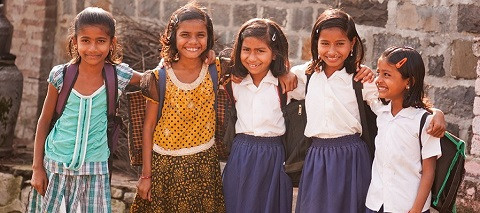
GCED Basic Search Form
Quick Search
You are here
News

UNESCO unveils a new fact sheet on girls’ education today ahead of International Women’s Day. The data is published as part of the #HerEducationOurFuture initiative which focuses on the progress achieved over the past 25 years. It shows that girls’ enrolment rates in primary and secondary education have almost doubled in low-income countries, and that the gender gap in primary enrolment has been halved. But it also shows that the pace of change is not fast enough. At the present rate, getting every girl into primary school will only happen in 2050.
The fact sheet is published on the occasion of the 25th anniversary of the Fourth World Conference on Women (Beijing in 1995), which culminated with the Beijing Declaration and Platform for Action, a key global policy document on gender equality and the most ambitious roadmap for the empowerment of girls and women.
“Ignoring girls’ education is akin to ignoring one of the most effective solutions for development,” said the Director-General for UNESCO, Audrey Azoulay. “When girls access quality education, it emboldens them to break the social stereotypes that hold back gender equality. It also gives them the tools to better navigate future life-altering choices on pregnancy, childbirth, and health challenges claiming millions of children’s lives around the world. We cannot achieve the world we want without the education and empowerment of all girls and women.”
The Global Education Monitoring (GEM) Report at UNESCO shows that if all women completed primary education, maternal deaths would be reduced by two-thirds. If they had a secondary education, child deaths would be cut by half, saving 3 million lives, and there would be two-thirds fewer child marriages. If all girls in sub-Saharan Africa, and in South and West Asia had a secondary education, the number of pregnancies among girls younger than 17 would fall by close to 60%. But slow progress is preventing girls from reaping these benefits. As the new interactive website, https://www.education-progress.org/en/ illustrates, the primary enrolment rate of girls over the past 25 years has only increased by ten percentage points from 78% to 88%, less than half a point per year.
The new fact sheet shows progress since 1995 in global commitment to girls’ right to an education through international Conventions as drawn from UNESCO’s HerAtlas, and areas where improvements are still needed. In 1995, the Beijing Platform for Action urged countries to eliminate gender discrimination in education, which is now prohibited by the constitutions of 90 countries. Since the Beijing Platform for Action, the number of States that have ratified the UNESCO Convention against Discrimination in Education (CADE) has increased from 82 to 105. However, this still means almost half have not signed it. By 1995, 150 States had ratified the UN Convention on the Elimination of All Forms of Discrimination against Women, which provides for equal rights for men and women. It has now been ratified by 189 States Parties, but 27 countries signed it with objections to particular articles on child marriage and discrimination policy.
A new social media campaign, under #HerEducationOurFuture, is being launched in partnership with multiple education organizations to help advance the commitments made on education in the Beijing Declaration. The campaign calls on girls and teachers to add their voices to call for change by saying what they would want to improve for the next generation. It is launched on International Women’s Day and the Commission for the Status of Women, which will feed inputs into The Generation Equality Forum. This is a global gathering for gender equality, convened by UN Women and co-chaired by France and Mexico, with civil society as a leader and partner. The Forum will kick-off in Mexico City, Mexico, (7-8 May 2020) and be concluded over three days in Paris, France (from 7 to 10 July 2020).
****
For more information and interviews, contact Kate Redman k.redman@unesco.org
+33(0)671786234
URL:
https://en.unesco.org/news/gender-gap-primary-school-enrolment-halved-over-past-25-years
